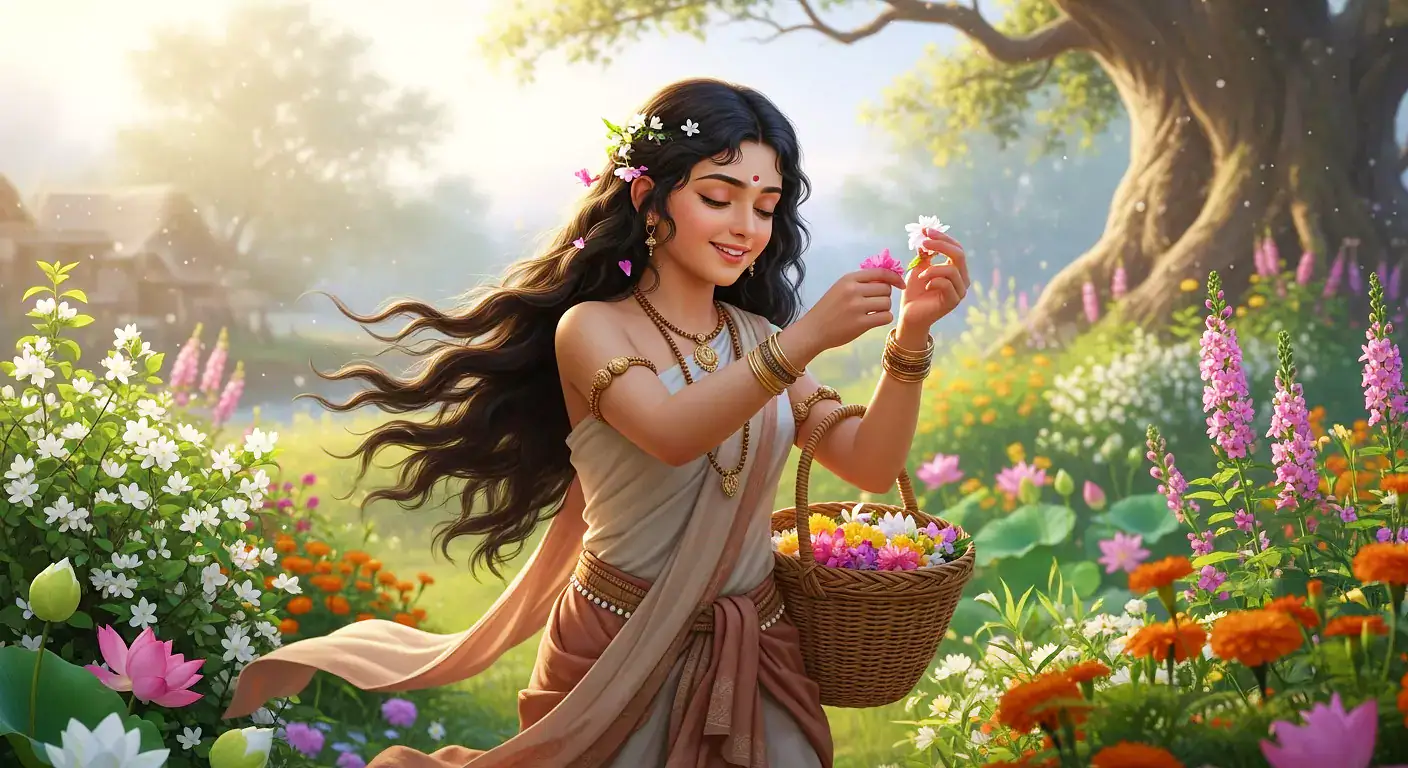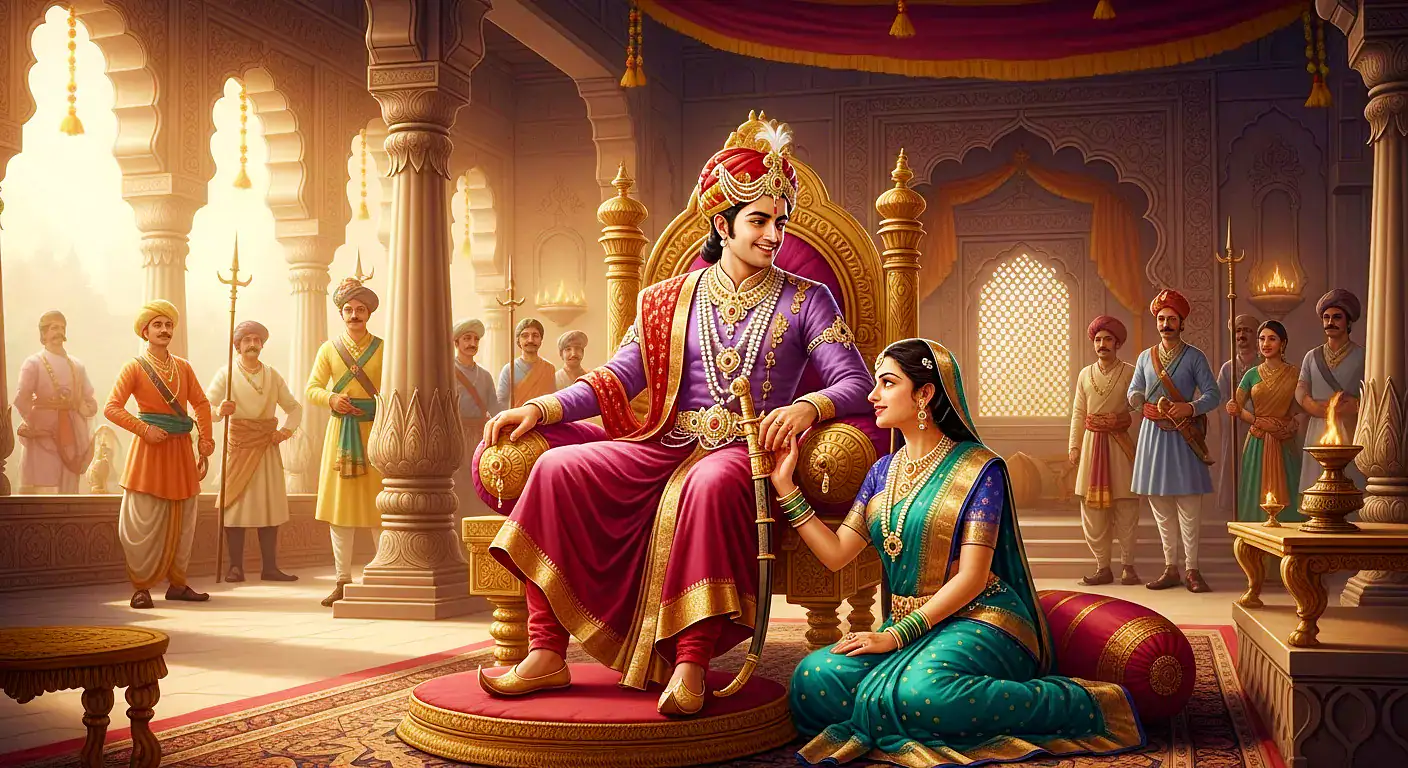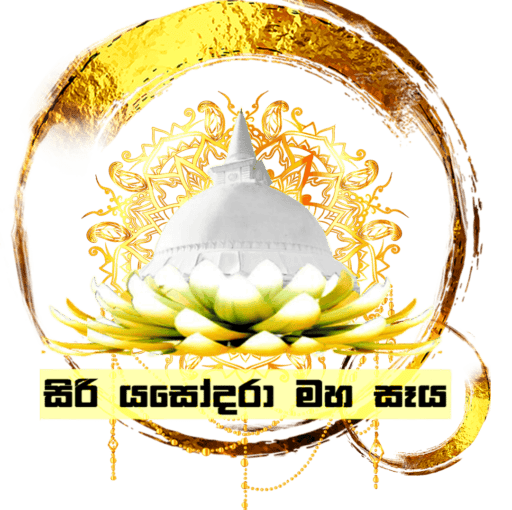KUMMĀSAPIṆḌA JĀTAKA
-
Save
The Master told this tale while dwelling in Jetavana, concerning Queen Mallikā. She was the daughter of the chief of the garland-makers of Sāvatthī, exceedingly beautiful and virtuous. When she was sixteen years of age, as she went to a flower-garden with some other girls, she carried three portions of sour gruel in a flower-basket. As she was leaving the city, she saw the Blessed One entering it, radiant and surrounded by the assembly of Brethren. At once she offered him the three portions of gruel.
The Master accepted, holding out his royal bowl. She saluted the Tathāgata’s feet with her head and, taking her joy as the subject of meditation, stood on one side. Observing her, the Master smiled. The Venerable Ānanda, seeing this, wondered at the reason and asked the Tathāgata.
The Master replied, “Ānanda, this girl will today become the chief queen of the Kosala king, as the fruit of these portions of gruel.”
The girl then went on to the flower-garden. That very day the Kosala king fought with Ajātasattu and, defeated, fled upon his horse. As he rode, he heard the sound of her singing, and being drawn by it, turned toward the garden. The girl’s merit was ripe: seeing the king, she did not flee, but came forward and seized the bridle at the horse’s nose.
The king, still on horseback, asked whether she was married or not. Learning that she was not, he dismounted, and being wearied with wind and sun, rested for a little while in her lap. Then he placed her upon the horse and, with his great army, entered the city, first bringing her to her own house. That evening he sent a chariot and, with great honour and pomp, brought her forth, seated her upon a heap of jewels, anointed her, and made her his chief queen.
From that time onward she was the dear, beloved, and devoted wife of the king, attended by faithful servants and endowed with the five feminine charms. She was also a favourite of the Buddhas. And it was noised abroad throughout the city that she had attained such prosperity because she had given the three portions of gruel to the Master.

-
Save
One day, in the Hall of Truth, the brethren began a discussion:
“Sirs, Queen Mallikā gave three portions of gruel to the Buddha, and as the fruit of that, on the very same day she was anointed queen. Great indeed is the virtue of the Buddhas.”
The Master came, asked the subject of their talk, and was told. Then he said:
“It is no wonder, Brethren, that Mallikā has become chief queen of the Kosala king by giving three portions of gruel to the Omniscient Buddha. For why? Because of the great virtue of the Buddhas. Wise men of old gave gruel without salt or oil to paccekabuddhas, and through that merit attained, in their next birth, the glory of being kings in Kāsi, a realm three hundred leagues in extent.”
And so he told this tale of old:
Once upon a time, when Brahmadatta was reigning in Benares, the Bodhisatta was born in a poor family. When he grew up, he earned his living by working for wages with a wealthy man. One day he bought four portions of sour gruel from a shop, thinking, “This will serve for my breakfast,” and went on his way to the fields.
As he went, he saw four paccekabuddhas approaching the city for alms. He thought, “I have these four portions of gruel. What if I were to give them to these noble ones who are coming to Benares for alms?” So he approached, saluted them, and said, “Sirs, I have these four portions of gruel in hand. I offer them to you. Pray accept them, good sirs, and may I thereby gain merit for my lasting good and welfare.”
When they accepted, he spread sand, arranged four seats, and covered them with branches. Seating the paccekabuddhas in order, he brought water in a leaf-basket, performed the water-offering, and with reverence placed the four portions of gruel in their bowls, saying, “Sirs, through this offering may I not be reborn in a poor family. May this be the cause of my attaining omniscience.”
The paccekabuddhas ate, gave thanks, and departed to the Nandamūla cave. As he saluted them, the Bodhisatta felt the joy of association with the paccekabuddhas. Even after they had passed from sight, he remembered them continually until his death. As the fruit of this deed, he was reborn in the womb of the chief queen of Benares.
He was given the name Prince Brahmadatta. From the time he could walk alone, he clearly remembered his past lives, as though seeing his own reflection in a polished mirror. He knew, “This birth, in this high state, is mine because I once gave four portions of gruel to paccekabuddhas, when I was a servant in this very city.”
When he came of age, he mastered the arts at Takkasilā. On his return, his father, pleased with his accomplishments, appointed him viceroy; and later, upon his father’s death, he was established as king. Then he married the exceedingly beautiful daughter of the Kosala king, and made her his chief queen.
On the day of his parasol-festival, the city was adorned as if it were a city of the gods. He rode in procession through its streets, then ascended the richly decorated palace. Upon the dais, beneath the white parasol, he mounted the golden throne and looked down upon all who attended: ministers on one side, brahmins and householders in splendid apparel on another, townsfolk bearing gifts, and, in another place, sixteen thousand dancing-girls, radiant as heavenly nymphs.
Beholding this splendour, the king remembered his former state and thought:
“This white parasol adorned with golden garlands, this throne of massive gold, these thousands of elephants and chariots, this vast realm filled with jewels and pearls, abounding in wealth and grain of every kind, these women like the nymphs of heaven—this glory, which is mine alone, has come to me through an offering of four portions of gruel given to four paccekabuddhas. All this I have gained through them.”
Remembering the excellence of the paccekabuddhas, his heart was filled with delight. Overcome with joy, he uttered these stanzas before the multitude:
Service rendered to the wise
Ne’er, they say, is done in vain.
Alms of gruel, saltless, dry,
Brought me this abundant gain.
Elephant and horse and kine,
Gold and corn and all the land,
Troops of maidens, fair, divine—
Alms have placed them in my hand.
Thus, in joy and delight on the day of his parasol-festival, the Bodhisatta sang his song of gratitude. From that day forward, these verses were called the king’s favourite song. His dancing-girls sang them, his musicians sang them, the palace folk sang them, the townspeople sang them, and even the ministers made them their song.

-
Save
After much time had passed, the chief queen became eager to know the meaning of the king’s song. Yet she dared not ask him directly.
One day the king was pleased with her and said, “Lady, I grant you a boon. Choose what you will.”
“It is well, O king. I accept.”
“What shall I give you—elephants, horses, or treasure?”
“O king, through your grace I lack nothing. I have no need of such things. But if you truly wish to grant me a boon, tell me the meaning of your song.”
“Lady, what need have you of that? Choose another boon.”
“O king, I desire nothing else. This alone I will accept.”
“Then, lady, I will tell you—but not as a secret to you alone. I will send the drum through all Benares, twelve leagues in extent. At my palace gate I will raise a jewelled pavilion and set there a jewelled throne. On it I shall sit, surrounded by ministers, brahmins, townsfolk, and the sixteen thousand women of the court. There I will declare the meaning.”
She agreed. So the king had all prepared as he had said. He sat upon the throne, radiant amidst a great assembly, like Sakka among the gods. The queen, adorned in all her ornaments, sat on a golden chair at one side. With a sidelong glance she said:
“O king, tell me—explain to me the meaning of the song you sang in your delight, as though causing the moon to rise in the sky.”
And so she uttered this stanza:
Glorious and righteous king,
Oft you sing this joyful song.
In the fullness of your heart,
Tell to me what moved it on.
Then the Great Being, declaring the meaning of the song, spoke these verses:
This the city, yet my station
In past birth was not the same:
Servant to another’s household,
Earning wages free from blame.
On my way to toil in fields
Four ascetics once I saw,
Passionless, serene in bearing,
Perfect in the holy law.
All my heart went forth in faith;
Water brought I with my hand,
And I offered them my gruel,
Pious gift, both pure and planned.
Such the virtuous deed I wrought:
See the fruit I reap to-day—
Kingly power, wealth, and splendour,
All this realm beneath my sway.
When the queen heard the Great Being thus explain the fruit of his deed, she said joyfully:
“Great king, if you so clearly perceive the fruits of charity, then from this day take always a portion of rice, and eat not until you have given to worthy priests and brahmins.”
And she spoke in praise of the Bodhisatta:
Eat, remembering alms once given;
Set the Wheel of Law aright.
Flee from wrong, O mighty sovereign,
Rule the kingdom just and bright.
The Great Being, accepting her counsel, replied with this stanza:
Still I walk that path of merit,
Treading where the good have gone.
Fair queen, saints are dear unto me;
Their pure company I own.
Then, looking upon her beauty, the king said:
“Lady, I have told fully the good deeds of my former birth. But among all these maidens none equals you in beauty and grace. Tell me, by what deed did you gain such loveliness?”
And he spoke this stanza:
Lady, fair as nymph of heaven,
You outshine the maids around.
Tell, what gracious act was given,
Whence this beauty so profound?
Then the queen declared the deed of her past birth, saying:
Once I was a handmaid’s servant
At Ambattha’s royal court.
To modesty my heart was given,
To virtue and to good report.
In a begging Brother’s bowl
Once I placed a gift of rice.
Charity had filled my soul—
Lo! the fruit, this form of price.
Thus both the king and queen, each remembering former lives, fully declared their past deeds.
From that day they caused six great halls of charity to be built—at the four gates of the city, in the city’s center, and at the palace gate. Stirring up all India to generosity, they gave great gifts, observed the moral precepts and holy days, and at the end of their lives passed to a heavenly destiny.
When the Master had ended this discourse, he identified the Birth in these words:
“At that time, Rahula’s mother was the Queen; Ananda was the parrot; Sariputta was the ascetic who gave the mango fruit; and the ascetic who lived in the park was I myself.”
Source : The Jataka , E.B. Cowell and W.H.D. Rouse
